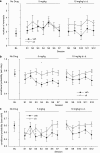Serotonin modulates sensitivity to reward and negative feedback in a probabilistic reversal learning task in rats
- PMID: 20107431
- PMCID: PMC3055347
- DOI: 10.1038/npp.2009.233
Serotonin modulates sensitivity to reward and negative feedback in a probabilistic reversal learning task in rats
Abstract
Depressed patients show cognitive deficits that may depend on an abnormal reaction to positive and negative feedback. The precise neurochemical mechanisms responsible for such cognitive abnormalities have not yet been clearly characterized, although serotoninergic dysfunction is frequently associated with depression. In three experiments described here, we investigated the effects of different manipulations of central serotonin (5-hydroxytryptamine, 5-HT) levels in rats performing a probabilistic reversal learning task that measures response to feedback. Increasing or decreasing 5-HT tone differentially affected behavioral indices of cognitive flexibility (reversals completed), reward sensitivity (win-stay), and reaction to negative feedback (lose-shift). A single low dose of the selective serotonin reuptake inhibitor citalopram (1 mg/kg) resulted in fewer reversals completed and increased lose-shift behavior. By contrast, a single higher dose of citalopram (10 mg/kg) exerted the opposite effect on both measures. Repeated (5 mg/kg, daily, 7 days) and subchronic (10 mg/kg, b.i.d., 5 days) administration of citalopram increased the number of reversals completed by the animals and increased the frequency of win-stay behavior, whereas global 5-HT depletion had the opposite effect on both indices. These results show that boosting 5-HT neurotransmission decreases negative feedback sensitivity and increases reward (positive feedback) sensitivity, whereas reducing it has the opposite effect. However, these effects depend on the nature of the manipulation used: acute manipulations of the 5-HT system modulate negative feedback sensitivity, whereas long-lasting treatments specifically affect reward sensitivity. These results parallel some of the findings in humans on effects of 5-HT manipulations and are relevant to hypotheses of altered response to feedback in depression.
Figures




References
-
- Adell A, Artigas F. Differential effects of clomipramine given locally or systemically on extracellular 5-hydroxytryptamine in raphe nuclei and frontal cortex. An in vivo brain microdialysis study. Naunyn Schmiedebergs Arch Pharmacol. 1991;343:237–244. - PubMed
-
- Aghajanian GK, Sprouse JS, Rasmussen K.1987Physiology of midbrain serotonin systemIn: Meltzer HY (ed).Psychopharmacology: The Third Generation of Progress Raven Press: New York; 141–149.
-
- Anderson IM, Del-Ben CM, McKie S, Richardson P, Williams SR, Elliott R, et al. Citalopram modulation of neuronal responses to aversive face emotions: a functional MRI study. Neuroreport. 2007;18:1351–1355. - PubMed
-
- Artigas F, Romero L, de Montigny C, Blier P. Acceleration of the effect of selected antidepressant drugs in major depression by 5-HT1A antagonists. Trends Neurosci. 1996;19:378–383. - PubMed
-
- Bari A, Dalley JW, Robbins TW. The application of the 5-choice serial reaction time task for the assessment of visual attentional processes and impulse control in rats. Nat Protoc. 2008;3:759–767. - PubMed
Publication types
MeSH terms
Substances
Grants and funding
LinkOut - more resources
Full Text Sources
Other Literature Sources
Miscellaneous

